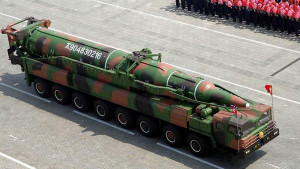
Representatives of the Republic of Korea made a grave accusation against the Russian Federation in connection with the critical situation around the launching of the North Korean missile. On February 7, Director of the South Korean National Intelligence Service Lee Byoung-ho held a closed-door briefing for the members of the National Security Council, after which South Korean lawmaker Lee Cheol Woo announced to journalists that “North Korea, of course, did something on its own, but important technology was most likely given by Russia and there is plenty of information that supports this.”
The news about the alleged “Russian traces,” caused a real stir among right-wing conservatives. Some of them even posted messages in their social networking accounts urging that the diplomatic relations between the two countries immediately be severed. Representatives of the Russian “democratic opposition” were more than eager to “spread the good news” because such accusations are very serious. And the reason is just apparent: ultimately, the allegations imply that not only the Russian Federation grossly violates the UN sanctions, but also undermines the nuclear non-proliferatio
It did not take Russia long to respond. At first, they were ironic remarks made by some private individuals. Deputy Prime Minister, Dmitry Rogozin, called the South Korean accusations “nonsense.” “Lately, the degree of ludicrousness of South Korea intelligence statements has by far surpassed that of latrine wireless,” he wrote on his Twitter account. Representatives of the Russian Ministry of Foreign Affairs also called these statements “an irresponsible provocation aimed at disgracing Russia by implication.” Roskosmos has also refuted South Korean allegations.
As it turned out, even the Ministry of Defense did not support the stance of the intelligence officers. When a representative of the South Korean Agency for Defense Development was asked a direct question, “What is your opinion about the statement our intelligence made that the Democratic People’s Republic of Korea has, possibly, received major parts and missile technology from Russia?” He answered, “Right now, while we do not have fragments of the booster rocket, I cannot make any comments on this matter.”
He also said that the launched missile was similar to that tested in December 2012. This is an important observation, since at that time South Korean experts detected some fragments of the missile and concluded that only insignificant parts like sensors and transducers were made in Taiwan, while the rest of the components were produced in North Korea.
Soon thereafter, fragments of the last missile were discovered. They were demonstrated on TV, and once again technical experts directly involved in the investigation did not confirm the “Russian traces.”
In this regard, the Russian Foreign Ministry issued an official statement. As Director of the Department for Non-Proliferatio
In this situation, they had to apologize. More precisely, the South Korean authorities expressed regret regarding the misunderstanding and shuffled off the responsibility for scandal to the lawmaker who “incorrectly conveyed” the conversation. As it turned out, the intelligence officers “never mentioned anything about transferring relevant Russian technologies and components to the North Korean party with approval of the Russian government.” They, as it now appears, talked only about possible “penetration of relevant technologies and components to North Korea from neighboring countries,” because the Democratic People’s Republic of Korea “makes unceasing efforts to get a hold of relevant technologies and components for their missile program needs, by engaging in illegal activities with respect to the states possessing missile technologies.”
At a regular briefing, Cho June-hyuck, Spokesperson and Deputy Minister for Public Relations of the Ministry of Foreign Affairs of the Republic of Korea, has also admitted that “the content of the real conversation had been conveyed inaccurately. Therefore, we express our hope that this incident will no longer cause unnecessary interpretations.” However, according to sources of Rossiyskaya Gazeta, Moscow treated the statements of the Foreign Ministry of the Republic of Korea with skepticism. This is not the first time that South Korean officials have used “the minister’s personal opinion does not reflect Seoul’s official stance” excuse, or blamed journalists for twisting the truth. For, it would be highly doubtful that the lawmaker, Lee, who works as the spokesperson of the intelligence service for journalists (he was the one to bring forward all other sensational news before) would distort the message this time.
For some reason it feels as if either South Korean intelligence officers or right-wing conservative “lawmakers” decided once again to cash in on the deteriorating Russian-American relations acting in accordance with the “accidentally on purpose ” routine since none of those who spread the “sensation” that “the Republic of Korea’s intelligence discovered that…” published a line contradicting the allegations after all.
Konstantin Asmolov, Ph.D in History, Leading Research Fellow of the Center for Korean Studies, Institute of Far Eastern Studies, Russian Academy of Sciences, especially for the online magazine “New Eastern Outlook.”
